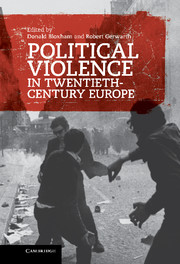3 - Genocide and ethnic cleansing
Published online by Cambridge University Press: 05 June 2012
Summary
Genocide and ethnic cleansing are forms of political violence because they politicize nationality, ethnicity, race and religion. Branded as traitors or feared as security threats, minority populations have been murdered and deported in astonishing numbers during Europe's long twentieth century. Why these phenomena accelerated and peaked in its first half, in particular, remains in dispute. The burgeoning scholarly literature on genocide and ethnic cleansing tends to fall into one of two categories. It is concerned either with one individual episode or perpetrating regime, or with comparing the phenomenology of different genocides across large tracts of time and space. With a few notable exceptions, it rarely explores extensive causal or contextual interconnections between different cases. As a relatively small global region, the Europe of the long twentieth century is a spatio-temporal setting that lends itself very well to examining the relationship between ostensibly separate episodes and, along the way, problematizing or dismantling some of the simplistic explanations that have hitherto held sway about the relationship between specific sorts of ideology, regime and state form and the mass murder or violent eviction of civilian populations.
Contrary to the accumulated history of ideas of racism and ethnonationalism that often passes for explanation of genocide studies, the pure, abstract logic of exclusionary ideology is rarely sufficient to push even extremists into ethnic cleansing or genocide. How and how far a goal of homogeneity is pursued depends upon the contingent course of events.
- Type
- Chapter
- Information
- Political Violence in Twentieth-Century Europe , pp. 87 - 139Publisher: Cambridge University PressPrint publication year: 2011
- 2
- Cited by



